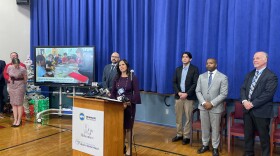The relationships we share with our siblings are unique — whether some consider it a bond, or at times, a burden. For Lake Effect essayist Joanne Nelson, thinking about her brother brings up many mixed emotions. She remembers the man once filled with buzzing energy while contending with the image of who he turned into:
“Dale,” the restaurant’s hostess calls from her list, and because it’s been five years I don’t look up. My brother’s dead, and no hostess will raise him or call him forth to claim one last omelet. I’d like to see him cross the foyer of rustling people-filled benches though, have him share in this Sunday morning buzzing energy. Hear him complain about the wait, feel his pockets for smokes, say “don’t give me that look” before stepping outside. I want to call his name, say it out loud like the hostess says it: quick and easy. Dale. Hey Dale, what are you doing? Dale, want to come over? Dale, can I come over? Dale will you, can you?
It was a bleak, watery day the last time I drove north and then further north to his cabin in the woods, desperate to see the state of his life or non-life for myself. He didn’t rise from the one comfortable chair when I walked in, didn’t turn his head to offer welcome or hello. A still life: barefoot, shirt but no pants, beer bottles and cigarettes and ashtray within reach. Even the smells suspended, unwashed, motionless. Piled mail. The place hazy with cigarette smoke. I watched him light the wrong end of a cigarette and take a puff and another puff before turning it around. His tired, unkempt, also hazy-with-cigarette smoke dog, a shadow next to his chair. Scrambled eggs hunks amongst the unwashed plates in the sink, the grimy knives and forks. I boiled the flatware—it was that bad—scrubbed the rest so I could make him a meal: chicken and rice to make everything nice again. I picked through and tossed the gunk so the drain could run clear. He didn’t remember making eggs he told me. Thought he might have puked in the sink.
Dale Michael. Dale had a lopsided grin. Dale played catch with me. Dale grew up and married and worked and divorced and married and worked and divorced two more times, and just got tired of it all I guess. Dale shot his dishwasher. Dale got pulled over. Dale this and Dale that. Dale said he wouldn’t but did, and promised but didn’t. Dale has a broken liver; Dale’s kidneys don’t work. Dale is almost sure who I am. Says, “sister.” Pauses. “You’re my sister.” He eats his napkin along with his pudding, he sees dancing girls in his room at night. He doesn’t get better. Dale won’t answer no matter how many times his name is called.
Lake Effect contributor Joanne Nelson lives in Hartland, Wis., and is the author of the forthcoming memoir This is How We Leave.






